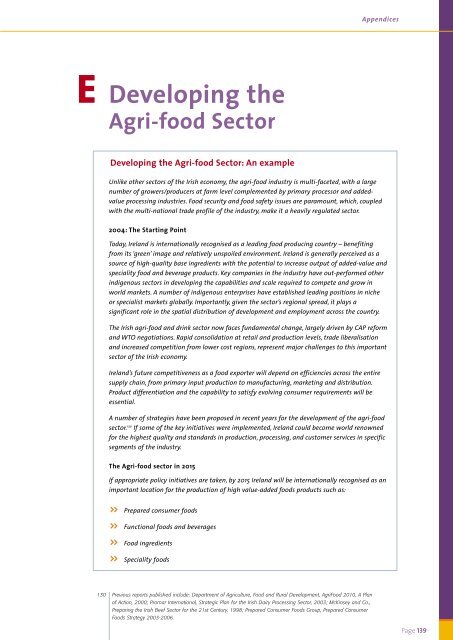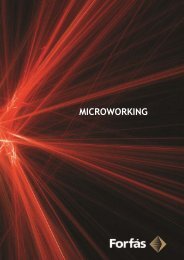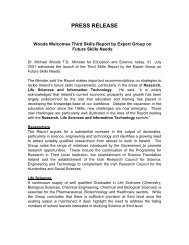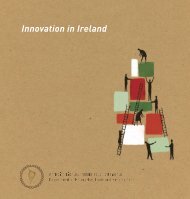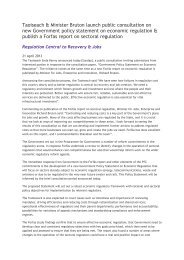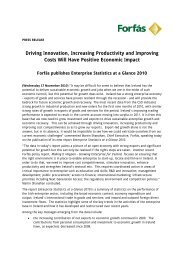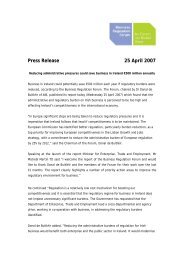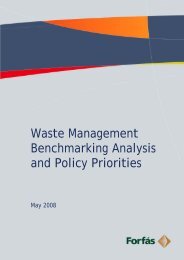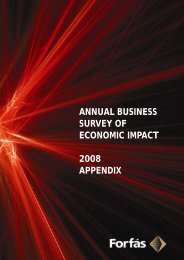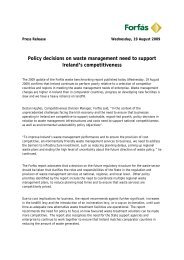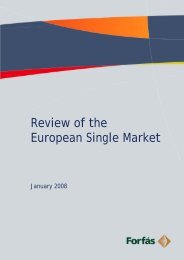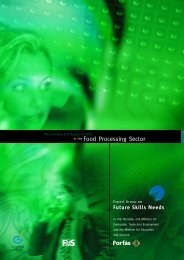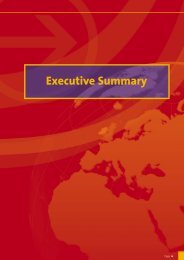Enterprise Strategy Group Report - Appendices - Forfás
Enterprise Strategy Group Report - Appendices - Forfás
Enterprise Strategy Group Report - Appendices - Forfás
You also want an ePaper? Increase the reach of your titles
YUMPU automatically turns print PDFs into web optimized ePapers that Google loves.
E<br />
Developing the<br />
Agri-food Sector<br />
Developing the Agri-food Sector: An example<br />
<strong>Appendices</strong><br />
Unlike other sectors of the Irish economy, the agri-food industry is multi-faceted, with a large<br />
number of growers/producers at farm level complemented by primary processor and addedvalue<br />
processing industries. Food security and food safety issues are paramount, which, coupled<br />
with the multi-national trade profile of the industry, make it a heavily regulated sector.<br />
2004: The Starting Point<br />
Today, Ireland is internationally recognised as a leading food producing country – benefiting<br />
from its ‘green’ image and relatively unspoiled environment. Ireland is generally perceived as a<br />
source of high-quality base ingredients with the potential to increase output of added-value and<br />
speciality food and beverage products. Key companies in the industry have out-performed other<br />
indigenous sectors in developing the capabilities and scale required to compete and grow in<br />
world markets. A number of indigenous enterprises have established leading positions in niche<br />
or specialist markets globally. Importantly, given the sector’s regional spread, it plays a<br />
significant role in the spatial distribution of development and employment across the country.<br />
The Irish agri-food and drink sector now faces fundamental change, largely driven by CAP reform<br />
and WTO negotiations. Rapid consolidation at retail and production levels, trade liberalisation<br />
and increased competition from lower cost regions, represent major challenges to this important<br />
sector of the Irish economy.<br />
Ireland’s future competitiveness as a food exporter will depend on efficiencies across the entire<br />
supply chain, from primary input production to manufacturing, marketing and distribution.<br />
Product differentiation and the capability to satisfy evolving consumer requirements will be<br />
essential.<br />
A number of strategies have been proposed in recent years for the development of the agri-food<br />
130 sector. If some of the key initiatives were implemented, Ireland could become world renowned<br />
for the highest quality and standards in production, processing, and customer services in specific<br />
segments of the industry.<br />
The Agri-food sector in 2015<br />
If appropriate policy initiatives are taken, by 2015 Ireland will be internationally recognised as an<br />
important location for the production of high value-added foods products such as:<br />
Prepared consumer foods<br />
Functional foods and beverages<br />
Food ingredients<br />
Speciality foods<br />
130 Previous reports published include: Department of Agriculture, Food and Rural Development, AgriFood 2010, A Plan<br />
of Action, 2000; Promar International, Strategic Plan for the Irish Dairy Processing Sector, 2003; McKinsey and Co.,<br />
Preparing the Irish Beef Sector for the 21st Century, 1998; Prepared Consumer Foods <strong>Group</strong>, Prepared Consumer<br />
Foods <strong>Strategy</strong> 2003-2006.<br />
Page 139


